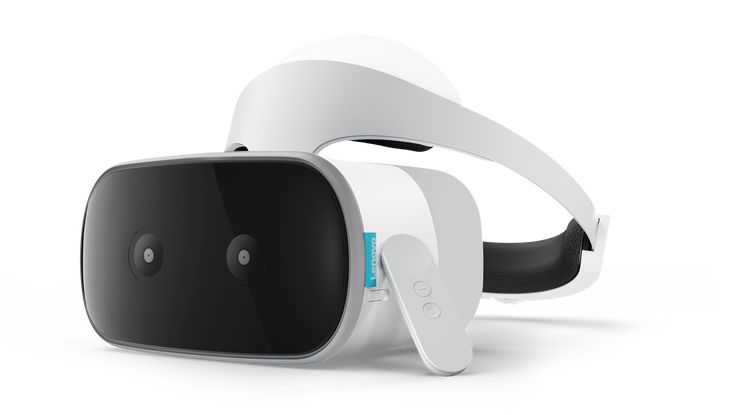

We got our first full look at a positionally tracked Daydream headset running Google’s WorldSense technology today.
Lenovo unveiled the Mirage Solo headset today, which it hopes to ship in the second quarter of this year. The standalone device will sport a Qualcomm 835 chipset, 4GB of RAM and 64 gigs of onboard memory. It also will have dual mics, a headphone jack (!) and a 2560 x 1440 LCD screen. The company claims 7 hours of battery life, which, if accurate, is pretty great.

The big news is its support for Google WorldSense, an inside-out positional tracking technology similar to what Microsoft uses on its line of “Mixed Reality” VR headsets.
Though the Mirage Solo sports positional tracking, the device may ultimately still be limited by its Wiimote-like controller, which is identical in layout to what ships with the Daydream View, Google’s headset for smartphone-based mobile VR. Oculus is working on a positionally-tracked headset, currently code-named Santa Cruz, which also will have tracked controllers that will help deliver experiences more comparable to what’s possible on high-end headsets now.
There is quite a bit of Daydream content now available through Google’s VR storefront, the question is whether the Lenovo headset will be popular enough to drive developers to update content for its positional tracking and create wholly new experiences that are only possible with the 6DoF tracking technology. Today, Google announced a Blade Runner game that you can play on the Solo.

The headset is being priced pretty aggressively by Lenovo, which doesn’t have a final price set, but says the device will cost less than $400. At the moment, this headset is the lone WorldSense headset in existence, and without any new partnership announcements, it will stay that way for a bit. HTC had initially signed on to launch a headset based on the Google platform, but canceled their plans and chose to release their Vive Focus headset exclusively in China in partnership with Qualcomm. That headset is retailing for around US$600.
Lenovo’s headset will have meaningful competition in Facebook’s Oculus Go. The $199 headset will lack the Mirage Solo’s positional tracking and more powerful internals, but sits at what may be a much more palatable price point for consumers wanting to flirt with the technology but who aren’t quite ready to buy a bulky PC or a game console variant.

